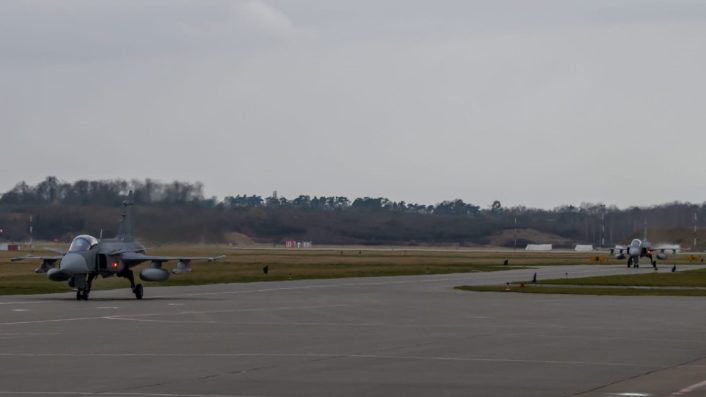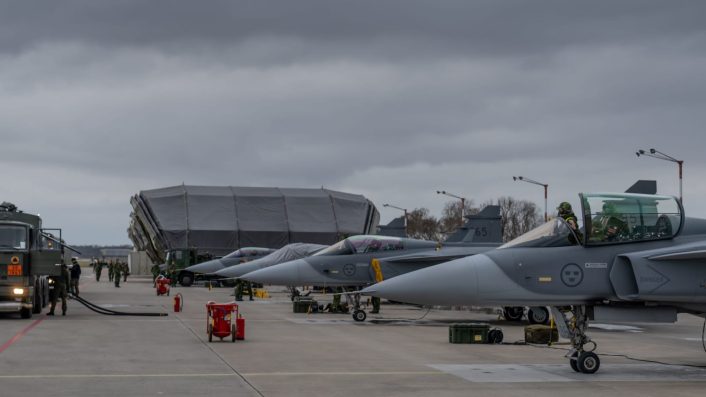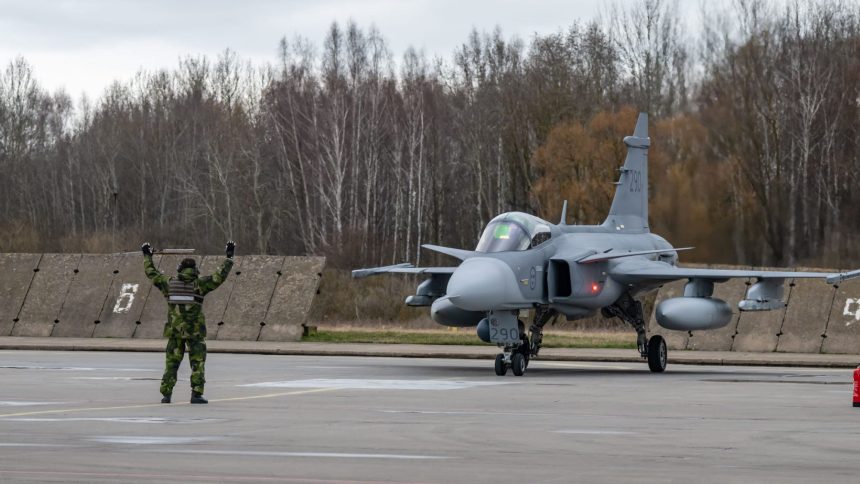Swedish Gripens deployed to Poland for their first Enhanced Air Policing Mission, joined by RAF Typhoons.
NATO’s (North Atlantic Treaty Organization) Air Policing missions in Europe saw major handovers in the last two days. On the evening of Mar. 26, 2025, the Swedish Air Force (Flygvapnet) started its Enhanced Air Policing (EAP) mission with six Saab JAS39 Gripen at the 22nd Air Base in Malbork, northern Poland, along the Baltic Sea.
This marks the first time Sweden deploys fighters on a NATO Air Policing Mission on a member state’s territory since it joined the alliance a year ago. Until recently, Sweden had been contributing to Air Policing missions from Swedish territory, the NATO Allied Air Command said in a statement.
In Poland the Flygvapnet is also joined by RAF (Royal Air Force) Typhoons from the IInd Army Cooperation Squadron, assigned to RAF Lossiemouth, with the service designating the deployment as “Operation Chessman.”
In another part of Europe, four Italian Air Force (Aeronautica Militare/ItAF) F-2000s, as the Typhoons are designated in Italy, started their rotation as part of the Air Policing mission at Romania’s Mihail Kogălniceanu Air Base, on the coast of th Black Sea. They replaced the Spanish Air and Space Force, which completed its eight-month tour, first with their F/A-18 Hornets and then with their own Typhoons.
🇸🇪 Touchdown 🇵🇱
Swedish JAS 39 Gripen fighter jets have arrived in Poland to patrol and protect Allied air space as part of @NATO enhanced Air Policing. The Swedish fighters will work side by side with Typhoons of the Royal Air Force to ensure the security of our skies. pic.twitter.com/lLhmpfSm5i
— Försvarsmakten (@Forsvarsmakten) March 27, 2025
The Enhanced Air Policing mission was introduced by NATO as an “assurance measure” after Russia’s “illegal and illegitimate annexation of the Crimean peninsula” in 2014. “These assurance measures with the goal to demonstrate the collective resolve of Allies, demonstrate the defensive nature of NATO and deter Russia from aggression or the threat of aggression against NATO Allies,” the NATO statement said.
View this post on Instagram
Flygvapnet and RAF in Poland
Saying that “history was made,” the Forsvarsmakten explained that the six JAS39 Gripens assigned to the Norrbotten Wing (F 21) will participate in the EAP mission in Poland for two months. The Flygvapnet unit “prepared on site in Sweden” for the same amount of time, before the first elements began the journey down to Poland “a few weeks ago.” This was followed by “intensive work to get everything working.”
Only four of the JAS39 C Gripens could be seen in the officially released images. The aircraft were flying with external fuel tanks and a Litening targeting pod, with one aircraft also sporting an IRIS-T short-range AAM (Air-to-Air Missile) on each wingtip. The others were not carrying weapons for the ferry flight.

Acknowledging the cooperation with the RAF’s 140 EAW, the head of the Swedish contingent Col. Anders Gustafsson said that they will soon start “delivering towards the task of [maintaining] integrated air and missile defense.” “We have had very good and close cooperation with both the British and the Poles to ensure that all the pieces fall into place before the start. Everything has gone very well so far and we now look forward to starting to deliver to strengthen NATO’s air defense in terms of deterrence and to secure Polish airspace,” Gustafsson added.

The RAF has not mentioned the number of Typhoons it has sent, with the images only showing two Typhoon FGR4s. Supreme Headquarters Allied Powers Europe spokesperson U.S. Army’s Col. Martin O’Donnell said, in the release from NATO, that Sweden’s participation in the EAP is the most “significant contribution from NATO’s newest member.”
Wing Commander Christopher Jacob, commanding officer of the 140 Expeditionary Wing, said in the RAF’s statement about the deployment “We are here to defend and deter, standing ready to protect against any threat, whilst reassuring our allies of the UK’s commitment to NATO and the region. Additionally, we strive to foster partnership, advance interoperability, develop trust, and reinforce collaboration and unity among our NATO member partners.”
RAF Typhoons arrive in Poland ahead of their @NATO Air Policing campaign.
This deployment highlights the UK’s dedication to supporting NATO allies, and promoting the collective security of Europe.
Together with the Swedish Air Force we are #SecuringTheSkies. pic.twitter.com/Ynp9g3k3PY
— Royal Air Force (@RoyalAirForce) March 26, 2025
Italians assume Air Policing duty in Romania
Meanwhile in Romania, four ItAF F-2000s, supported by over 180 personnel, began their Air Policing deployment. An image showed ItAF members disembarking from a KC-767 at Mihail Kogălniceanu Air Base. The four F-2000s are from the 51st Wing (51° Stormo), based at Istrana Air Base in northern Italy.
The ItAF Typhoons are taking over from Spain’s eight-month deployment to Romania, who first assigned their F-18s and then their Eurofighter Typhoons to the NATO mission. Notably, this deployment also “directly follows the successful completion of Italy’s air policing mission in Lithuania, reinforcing its dedication to NATO’s collective deterrence and defence.”
The NATO release quoted the ItAF’s Task Force Air 51st Wing commander, Col. Marcello Vitucci, who said the service has “consistently demonstrated its capability and readiness in NATO’s Air Policing missions.” The year “2025 represents an important milestone: we celebrate ten years of commitment to Air Policing missions, not only in the Baltic Area, but also in Romania. Our presence here underscores our dedication to the Alliance’s security and stability,” Vitucci added.
🇮🇹 Air Force will assume #NATO’s enhanced Air Policing mission in 🇷🇴, taking over from the 🇪🇸 Air Force to secure Allied Airspace along the Alliance’s Southeastern flank
🇮🇹 Eurofighters & 🇷🇴 F-16s will safeguard the Romanian airspace 24/7
Read more: https://t.co/bESLXCY0K9 pic.twitter.com/aHdHhySwp8
— NATO Air Command (@NATO_AIRCOM) March 27, 2025
In 2024’s eight-month BAP (Baltic Air Policing) mission in Lithuania for instance, Italy was the “lead nation” and France as the “augmenting nation.” This was split into four-month legs from Aug. to Nov. 2024, and Dec. 2024 to Mar. 2025.
In the release announcing the internal handover from ItAF Eurofighter detachments at Šiauliai on Nov. 29, Col. Michele Nasto, commander of the outgoing Italian detachment said the detachment achieved over 800 flight hours, including the flights of the G550 CAEW (Conformal Airborne Early Warning) aircraft, and over “30 A-Scrambles,” while intercepting some 50 Russian aircraft.









